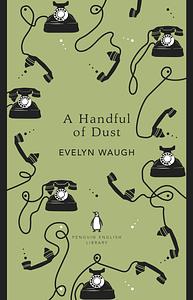Take a photo of a barcode or cover
Writing a funny novel seems really difficult. You have to get the tone just right, and don't get to rely on an actor who can use body language and their voice to clue you in on things. I think a lot of attempts to be funny in writing either fall flat, come across as just mean or you aren't quite sure if it was supposed to be funny or not. Waugh pulls of humor beautifully though. This book is hilarious, in a very very British way. Brits are just somehow better at the art of satire and of being subtle in their humor.
This starts off feeling like many other between the wars novels but you quickly realize you are not supposed to like the characters and that Waugh is mocking them. Especially Brenda. Dear God she was gloriously awful. Waugh was going through a divorce at the time of writing this and he appears to have channeled his hatred of his wife onto Brenda. But then things don't end well for the poor cuckholded husband. I'll never look at a Charles Dickens novel the same way again!
This starts off feeling like many other between the wars novels but you quickly realize you are not supposed to like the characters and that Waugh is mocking them. Especially Brenda. Dear God she was gloriously awful. Waugh was going through a divorce at the time of writing this and he appears to have channeled his hatred of his wife onto Brenda. But then things don't end well for the poor cuckholded husband. I'll never look at a Charles Dickens novel the same way again!
Bizarre and depressing, written in the same flavor as vile bodies which I loved a lot
Picked up an old hardback out of a box marked "FRE BOOKS" on the street and got this. A+++ would be shocked by the biting modernity and unsparing class critique of a nearly 100-year-old novel again.
Much funnier than Brideshead Revisited, but at the same time tragic - a tragicomedy, if you will. Think Anna Karenina from a satirist.
I think Evelyn Waugh and I get along so well because he's as appalled by people as I am. "Hard Cheese on Tony indeed."
This is such a good book. If you want a really amazing analysis of English upper class, this is the book for you.
The ending completely catches you though. Really really odd ending.
The ending completely catches you though. Really really odd ending.
I found Waugh's criticism of 1930s Britain to be quite compelling. Much of what gets hyped up about this novel is the ending, which I won't touch on in too much detail, though I did find it quite ironic and bitter.
A far more interesting theme to me was the role of divorce in the novel. Tony and Brenda do not have a clean break, and everyone in the posh peanut gallery of London seems to have a vested interest in their split. The way the supporting cast casually discusses how the end of a marriage brought them social capital was the most powerful part of the book for me. Pretty disgusting, and it's an interesting observation Waugh was making.
A far more interesting theme to me was the role of divorce in the novel. Tony and Brenda do not have a clean break, and everyone in the posh peanut gallery of London seems to have a vested interest in their split. The way the supporting cast casually discusses how the end of a marriage brought them social capital was the most powerful part of the book for me. Pretty disgusting, and it's an interesting observation Waugh was making.
What a hard book to rate. I didn't "like" it, but I guess I appreciated it. What a bleak picture of the modern world. No one believes in anything, cares about anything, or stands for anything. No one is good, no one is evil - just selfish and shallow. The main character's one stab at a valiant, meaningful act just devolves into a horrible and pathetic end. A depressing evaluation of the human condition, yet it felt Really Real.
emotional
hopeful
sad
slow-paced
Plot or Character Driven:
Character
Strong character development:
Complicated
Loveable characters:
Complicated
Diverse cast of characters:
No
Flaws of characters a main focus:
Yes


